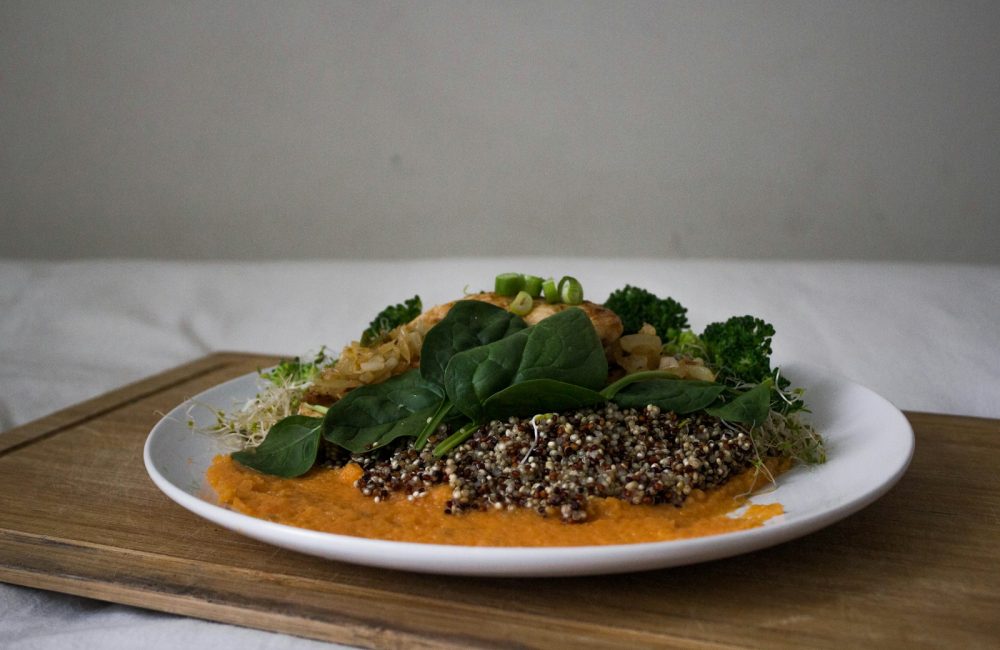Saponins are a class of naturally occurring phytochemicals found in a wide variety of plant foods. Known for their ability to support immune health, saponins have been studied for their potential to modulate immune responses, promote the production of antibodies, and enhance the activity of certain immune cells. By incorporating saponin-rich foods into your diet, you can help bolster your immune system and improve overall health.
Here are 12 of the best foods high in saponins that can contribute to immune stimulation and support a strong immune system.
1. Quinoa
Quinoa is a nutrient-dense whole grain that contains a high concentration of saponins. These compounds, found in the outer coating of quinoa, have been studied for their ability to promote a healthy immune response by increasing the activity of immune cells such as macrophages and lymphocytes. Additionally, saponins in quinoa may stimulate the production of antibodies, helping the body defend against infections and other pathogens.
Quinoa is also a great source of plant-based protein, fiber, and essential vitamins and minerals, making it a highly nutritious addition to any diet. Its versatility in cooking allows it to be used in various dishes, from salads and grain bowls to soups and breakfast porridge. Rinsing quinoa before cooking can reduce its natural bitterness while preserving its immune-boosting benefits.
2. Chickpeas
Chickpeas, also known as garbanzo beans, are another excellent source of saponins. These legumes are rich in protein, fiber, and essential nutrients, but their saponin content is what sets them apart in terms of immune support. Saponins in chickpeas can help regulate the immune system by modulating the activity of immune cells and promoting a balanced immune response.
Chickpeas can be incorporated into a wide variety of dishes, including soups, salads, and dips like hummus. Regular consumption of chickpeas may not only boost immune function but also provide other health benefits, such as improved digestion and cardiovascular health.
3. Spinach
Spinach is a leafy green vegetable packed with a variety of nutrients, including saponins. The saponins found in spinach play an important role in supporting immune function by exerting antioxidant and anti-inflammatory effects. These properties help protect immune cells from oxidative stress and reduce inflammation, which can improve overall immune health.
In addition to its saponin content, spinach is rich in vitamins A, C, and E, which are essential for maintaining a strong immune system. Whether eaten raw in salads or cooked in soups and sautés, spinach is a versatile and nutritious food that supports immune health.
4. Red Kidney Beans
Red kidney beans are a popular legume known for their rich saponin content, which helps promote immune health. The saponins in red kidney beans can modulate immune responses by enhancing the activity of immune cells such as macrophages, which are responsible for engulfing and destroying harmful pathogens. These saponins may also help reduce inflammation, further supporting immune function.
Incorporating red kidney beans into your diet is an excellent way to benefit from their immune-boosting properties while also enjoying their high protein and fiber content. They can be used in a variety of dishes, including chili, soups, and salads.
5. Soybeans
Soybeans are one of the richest sources of saponins, particularly soyasaponins, which have been extensively studied for their potential to modulate the immune system. Soyasaponins may help regulate the balance of immune cells, promoting an appropriate immune response and reducing the risk of overactivation, which can lead to inflammation and autoimmune issues.
In addition to their saponin content, soybeans are a complete source of protein, making them an excellent choice for vegetarians and vegans. Soybeans can be consumed in various forms, including tofu, tempeh, soy milk, and edamame, providing a flexible way to incorporate immune-supporting saponins into your diet.
6. Ginseng
Ginseng, a well-known adaptogenic herb, contains a unique group of saponins called ginsenosides. These bioactive compounds have been shown to support immune function by enhancing the body’s natural defense mechanisms. Ginsenosides may stimulate the production of immune cells, such as natural killer cells and T cells, which play a crucial role in protecting the body from infections.
Ginseng is often consumed in tea or supplement form, and regular use has been associated with improved immune resilience, especially during times of stress. In traditional medicine, ginseng is revered for its ability to enhance overall well-being and support the body’s immune system.
7. Tomatoes
Tomatoes are a widely consumed fruit that contains saponins, particularly in their skin and seeds. The saponins in tomatoes are thought to have immune-stimulating properties, helping to enhance the activity of immune cells and improve the body’s defense against pathogens. Tomatoes also contain other immune-supporting compounds, such as lycopene, an antioxidant that protects cells from damage.
Tomatoes are incredibly versatile and can be used in salads, sauces, soups, and more. Consuming tomatoes regularly can provide a natural source of saponins and other nutrients that support immune function and overall health.
8. Alfalfa Sprouts
Alfalfa sprouts are young shoots of the alfalfa plant and are an excellent source of saponins. These plant compounds may help modulate the immune system by promoting the activity of immune cells and supporting a balanced immune response. Alfalfa sprouts are also rich in vitamins and minerals that contribute to overall health and immune function.
Incorporating alfalfa sprouts into your meals is easy—they can be added to sandwiches, salads, and wraps to provide a crunchy, nutritious boost. Their high saponin content makes them a valuable addition to a diet focused on immune support.
9. Asparagus
Asparagus is a nutrient-dense vegetable that contains saponins with potential health benefits, including immune system support. The saponins in asparagus may help stimulate the activity of immune cells and protect against oxidative stress, which can weaken the immune system. Regular consumption of asparagus may enhance immune resilience and reduce the risk of infections.
Asparagus is also a rich source of vitamins A, C, and K, all of which are essential for maintaining a healthy immune system. It can be roasted, grilled, or steamed and served as a side dish or added to salads and pasta dishes for a flavorful and immune-boosting meal.
10. Fenugreek Seeds
Fenugreek seeds are small, golden seeds that are rich in saponins and have been traditionally used for their immune-boosting properties. The saponins in fenugreek seeds may help enhance the body’s defense mechanisms by stimulating the production of immune cells and promoting a balanced immune response. These seeds are also known for their anti-inflammatory properties, which can further support immune health.
Fenugreek seeds can be used in a variety of dishes, including curries, soups, and teas. Their saponin content, combined with their other health-promoting properties, makes them a valuable addition to an immune-supporting diet.
11. Oats
Oats are a whole grain that contains a specific type of saponin known as avenacins. These compounds are thought to have immune-stimulating effects, helping to boost the activity of immune cells and support overall immune function. Oats are also rich in beta-glucan, a type of soluble fiber that has been shown to enhance the immune response by activating macrophages and natural killer cells.
Incorporating oats into your diet is a great way to benefit from both their saponin content and their immune-boosting fiber. Oats can be enjoyed as oatmeal, added to smoothies, or used in baking to provide a healthy, immune-supporting meal.
12. Red Onions
Red onions contain saponins, particularly in their outer layers, that may have immune-modulating effects. The saponins in red onions can help support a healthy immune response by enhancing the activity of immune cells and reducing inflammation. Additionally, red onions are rich in quercetin, an antioxidant that supports immune function and helps protect against oxidative stress.
Red onions can be added to salads, sandwiches, and cooked dishes, providing a flavorful and nutritious way to incorporate saponins into your diet. Their combination of saponins and other immune-supporting compounds makes them a valuable food for promoting immune health.
Final Words
Incorporating saponin-rich foods into your diet is a natural and effective way to support and strengthen your immune system. From whole grains like quinoa and oats to legumes such as chickpeas and red kidney beans, saponins are found in a wide range of nutritious foods that offer multiple health benefits. These phytochemicals work by modulating immune responses, promoting the activity of immune cells, and reducing inflammation, all of which contribute to a balanced and resilient immune system.
Whether you’re adding spinach to your salad, enjoying a bowl of oatmeal, or using ginseng supplements, these 12 foods can enhance your body’s defense mechanisms and improve overall well-being. By making these immune-boosting foods a regular part of your diet, you can naturally support your health and better protect yourself against illness and infections.






